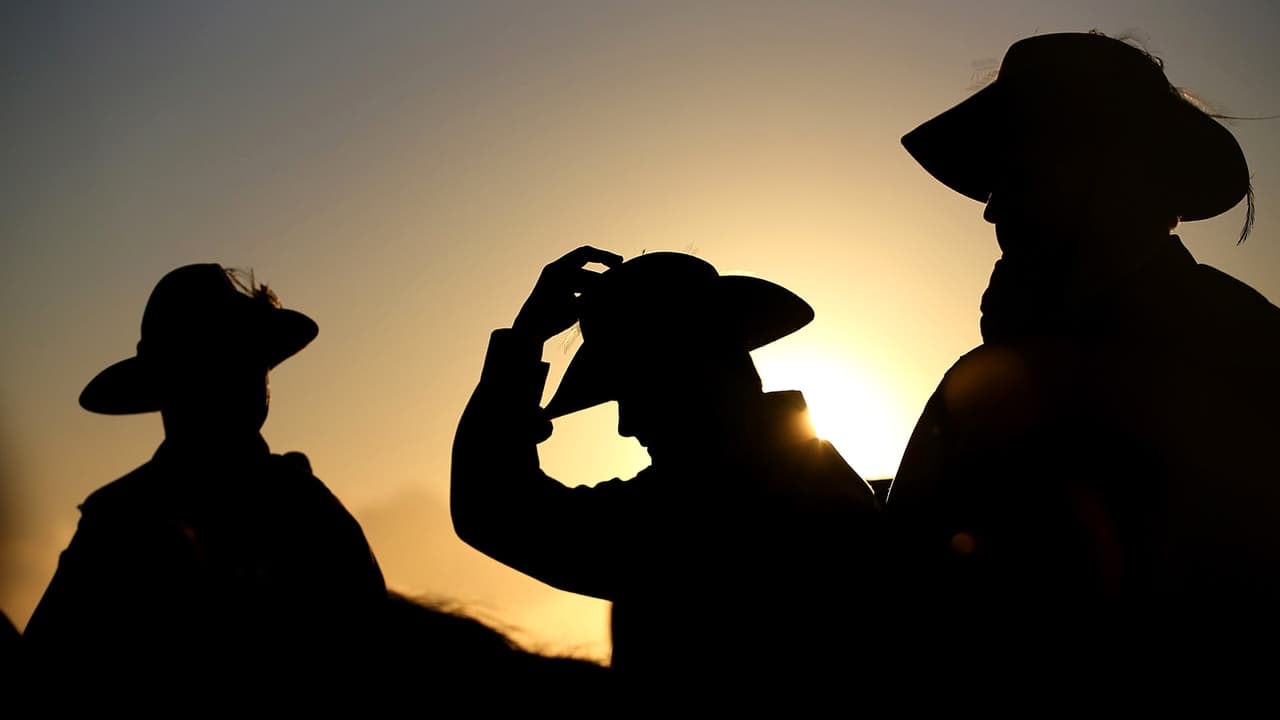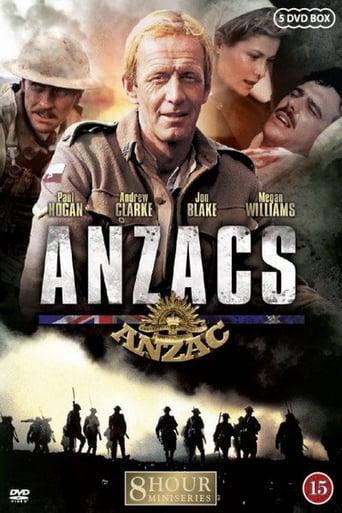Spidersecu
Don't Believe the Hype
Spoonatects
Am i the only one who thinks........Average?
Micah Lloyd
Excellent characters with emotional depth. My wife, daughter and granddaughter all enjoyed it...and me, too! Very good movie! You won't be disappointed.
Hayleigh Joseph
This is ultimately a movie about the very bad things that can happen when we don't address our unease, when we just try to brush it off, whether that's to fit in or to preserve our self-image.
bigdezdez
I remember seeing this mini-series on TV in New Zealand back late '80s and falling in love with it. Years later I bought the series from an ABC shop here in Australia and found that it's entertainment value had not been lost.I must admit, I was rather disappointed to hear that it was cut down to movie-length for the Nth American audience. I can't imagine that being done without losing key plot-points. It would be like turning Band Of Brothers into a 120minute film.I think the mini-series captured the sentiment of the soldiers, the politicians, and the families back home quite accurately. There is no denying that this film was made with an Australian audience in mind, and the difference in cultures between varying countries would undoubtedly see some people lose interest in the story-line and/or not understand or appreciate various moments or quotes. The fact of the matter is, there hasn't been enough of this content in this region of the world. All too often we see films depicting Americans as the winners of the wars. Not to discard their participation in either war, and with all due respect to their veterans, we must however remember that on both occasions of World Wars, the USA were rather late entrants. That said, the dialogue between characters was, at times, "Aussied-up" - but surely if we've learnt to understand "American" as a language, it can't be too hard to understand "Australian".Back to the story: By following the same group from the time war breaks out, to after peace has been declared, it's easy to see why so many people have compared it to an earlier, Australian version of Band Of Brothers. The characters are all strong and represent Working-class Australia of the time. Strong and entertaining performances by all, especially Andrew Clarke, John Blake, Christopher Cummins and Paul Hogan (purely the entertainment draw-card).As a born-and-bred Kiwi, I must admit that I'm not in the least offended or put out by the fact that there was basically NO mention of New Zealand in the entire series. I know that without "NZ" they would have been called the "AACS", but this film is a bit of Australiana. Along with "Gallipoli" and "The Light Horsemen", ANZACS is to Australians what "Chunuk Bair" is to New Zealanders.
Andrew Kitchener
Anzac Day seemed an appropriate day to bring out my World War one movies, and so I arrived home from the Dawn Service, and stuck the first episode of Anzacs starring Andrew Clarke, Paul Hogan, and Jon Blake, into the VCR.It was an excellent mini-series - or movie, depending on where you live - when I first watched it three years ago, and I was pleased to know that it hasn't lost any of it's filmic brilliance. Excellent performances from perennial Australian actor Andrew Clarke (playing Martin Barrington), legend Paul Hogan (cocky Pat Cleary) and Jon Blake (Flanagan) combined with great special effects, and much attention to historical detail, make this mini series an excellent thing to watch. It's certainly one of the best Australian productions ever.The thing that sets Anzacs apart from anything else is the way the film begins in Victoria, just before war is declared, and takes the viewer on a journey from the boot camps, to the Gallipoli Peninsula, and on to the hellish battlefields across France and Belgium. The series follows a small platoon, originating in Victoria, and their trials and tribulations throughout the four years of World War One.Key Australian actions from Lone Pine to the battle at Villers-Bretonneux are depicted with amazing attention to detail, and with great, sweeping battle sequences. The series is also remarkable in the way that it focuses on both the battlefield events, as well as events behind the lines. I like this, especially considering that infantry spent on 30% of their time in the line.Gallipoli and The Lighthorseman are unfairly compared to Anzacs but shouldn't be, because these two movies focus on only a small campaign, where as Anzacs is long enough to show the whole war.This is an excellent production, and is a good education into the way things happened during World War One, and is well worth the price of the video rental.Andrew
eagledes
I refer in these comments to the full 3-video mini-series, not the truncated version or film produced for the American market.In general, a well-produced and directed series which, with a few minor exceptions is probably as close to the true horror and carnage of the First World War as it is possible to get. Most of the minor errors can be explained by the requirements of plotting or pure visual effect and, in my opinion do not seriously detract from the overall truth of the subject matter.It should be remembered that this series was produced for the Australians, whose culture and memory is very different to that of the Americans who seem to have a collective down on this video/film. Perhaps if our North American cousins had come into the war several years earlier and suffered the casualties the Empire did they might have a different view of the series.The feeling throughout the series is of the AIF being abused and butchered by the incompetent British generals - and as a military historian I cannot say the series is wrong. However, other than one short scene, the series does not highlight the fact that the British were suffering just as much under their own generals.All in all I would say the viewer would get a much better idea of what the AIF and World War I was about by seeing this mini series than by viewing Gallipoli, which is generally thought to be historically weak.I would recommend the mini series but not the film or truncated North American video release.
mooncity
This is an interesting chronicle of the ANZACs, the Australian and New Zealand Army Corps.One reason my fellow reviewer here might not have enjoyed this film is that it was created for an entirely different culture (Australia). To brand it as "bad" simply because it isn't American is patently unfair.This made-for-TV production is really aimed squarely at the Australian audience, who still revere the memory of the ANZACs, the troops who suffered horrendous losses at Gallipoli in WWI. The heroism of the ANZACs, who fought so bravely and with such determination, was such that the Turkish enemy erected a monument to them.While it is true that the film (culled from a five-part mini-series), is not riveting entertainment compared to something like "Centennial" or "War and Rememberance", it does outline the feelings, views, and politics of the day faced by the ANZAC forces.The Australian and New Zealand viewpoints of the Great War are rarely on display, and here we have all of the various sentiments played out before us. The overall feeling (still is tangible today), is that the incompetence and arrogance of British officers (under whom the ANZAC force operated), were directly responsible for the waste of lives in pointless charges against the heavily entrenched Turkish forces.The mini-series is positively anti-colonial in regards to the portrayal of the British as uncaring, and more interested in saving British lives than that of the Aussies or New Zealanders.Paul Hogan will most likely be the only familliar face for American viewers. I would recommend the Mel Gibson film "Gallipoli" for those looking for a familliar cast and a relatively big budget look. That film also has more weight to it, and is more stylized.While "ANZACs" does come off as a bit like "light drama", or perhaps almost a glorified soap opera, if someone is interested in the topic of WWI, and the Australian and New Zealand participation in particular, the mini-series is worth a viewing. For scholars studying the events in this theater of the war, is a must see to examine both the attitudes of the day, and at the time the mini-series was made.

